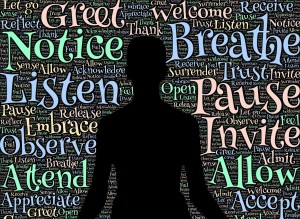Coaching, Counselling and Therapy, Online and in Chorley
 “Mindfulness” has become a bit of a buzz-word in psychology and therapy generally, being recommended as a treatment for depression and anxiety particularly. Essentially it is a technique for training the mind, little by little, to be able to watch and then let go of thoughts, emotions and physical sensations as they arise in the body and brain.
“Mindfulness” has become a bit of a buzz-word in psychology and therapy generally, being recommended as a treatment for depression and anxiety particularly. Essentially it is a technique for training the mind, little by little, to be able to watch and then let go of thoughts, emotions and physical sensations as they arise in the body and brain.
The idea is that this ability releases us from being at the mercy of unwanted tormenting thoughts, crippling emotions and even physical sensations like tinnitus and chronic pain.
The technique is derived from a Buddhist religious practice, with all the religious stuff stripped out of it, leaving the technique ready for Westerners to take advantage of. It requires no allegiances or memberships to any group, religious or otherwise. For us, it is part of the Life-skills Coaching we deliver one-to-one, or to small groups. Incidentally, some religious groups like Triratna(link) run courses I can recommend. Some, like Kadampa(link), I would suggest you avoid.
Like cycling, explaining the method is straightforward, and some benefit will be felt pretty well straight away, but as with cycling it does take regular and committed practice to become competent in day-to-day traffic! Well worth it, though.
How long has it been used in therapy? – the closest similar method I can think of is the technique of “Focusing” which was put forward by Eugene Gendlin in 1982. However I would say that all person-centred counselling (the type of counselling that we do) is applied mindfulness. And Carl Rogers had formulated the person-centred approach by 1951.
What does Mindfulness Coaching look like? At the start, it will look a lot like relaxation training. Once you are relaxed, your attention will be directed to specific areas that you are aware of – we would normally start with the body, and the breathing, and gradually encompass emotions and thoughts. Most of the work you will do at home as practical homework assignments. Gradually, you will learn how to broaden the technique out to encompass more and more of your life, so that your awareness becomes filled with present sensation, rather than the unhelpful and painful stuff going on that brought you to us. Only a few coaching sessions are required. After a few weeks, occasional appointments may be helpful to “touch base” and perhaps offer some fine tuning suggestions.
Mindfulness training is especially useful for those who are suffering, but, for one reason or another, do not want to come for counselling. For these people, there is the possibility of learning a useful life-skill quickly which is likely to help with the issues they have, and to develop a relationship with us should they decide to take up counselling later on.
All my counselling clients are offered some starter techniques in mindfulness. For those who wish to take it further I give a handout recommending a free certified online course in MBSR, (the training used in the NHS) and some useful phone apps. And of course I am able to help with issues and problems that arise during the course of the training.
Other names for Mindfulness Training: are they all the same? in essence, yes, although set within the work of different types of therapist. They all work.
Mindfulness-based Cognitive Therapy (MBCT)
Mindfulness-based Stress Reduction (MBSR)
Acceptance and Commitment Therapy (ACT)
Dialectical Behaviour Therapy (DBT)
Mindfulness for Depression (MfD) (yes, a small “f”)
Focusing-oriented (Psycho)therapy
Focusing-based Counselling.
Our Services:
Counselling (more about counselling)
Psychotherapy (more about psychotherapy)
Life-skills coaching (more about coaching)
Counselling and Coaching for Men – with David (more about working with men)
Relaxation Training (more about relaxation)
Mindfulness Training (more about mindfulness)
Between us, we have a wealth of training and experience, and we walk our talk.Do check Sue’s page (link) and David’s page (link) for more information.


